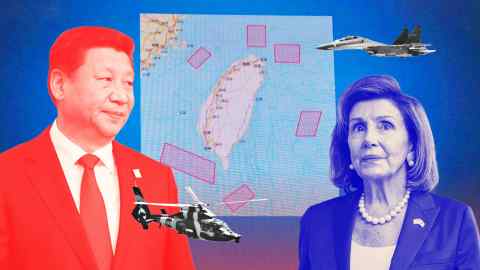
China has expanded military exercises around Taiwan, fueling fears of a prolonged period of heightened tension that is pressuring the US to respond.
Beijing’s largest military exercises around Taiwan were expected to end after navigation warnings for seven areas of the country expired early Monday.
But the People’s Liberation Army’s Eastern Theater Command said it was “continuing joint training under real war conditions, focusing on organizing joint anti-submarine warfare and naval attacks.”
The statement appeared to indicate that while the live-fire drills had concluded, the Chinese military was maintaining a campaign of pressure that has brought its fighter jets and warships ever closer to Taiwanese territory.
Taiwan’s defense ministry said the PLA exercises were having an adverse effect on international air traffic. “Their intention is to deal a blow to our morale and threaten regional security,” he said.
Last week, Tsai Ing-wen, Taiwan’s president, appealed to the international community for support.
The US government has repeatedly condemned China’s aggression. The G7 group of industrial nations has asked Beijing to defuse the situation. But Washington, which has long acted as Taiwan’s unofficial protector, has not revealed whether it will use military force to deter China.
Duan Dang, a regional security analyst in Vietnam, wrote on Twitter: “If the US does not do something militarily to push back China in the Taiwan Strait and re-establish a credible red line, it will be very bad! Frankly, no one in the region will believe in US commitments anymore.”
Aside from the military exercises, Beijing has also stepped up a propaganda offensive aimed at eroding the island nation’s confidence in its security while pandering to nationalist sentiment on the mainland.
After Chinese online mapping services began showing Taiwan in more detail last week, state media and diplomats began publishing posts and articles highlighting signs of Chinese culture in Taiwanese cities, which according to they reinforced Beijing’s claim to sovereignty.
A video posted on state broadcaster CCTV’s Weibo account showed street signs in Taipei bearing the names of Chinese cities and provinces including Tianjin, Shandong, Guiyang and Chongqing.
It was accompanied by a sentimental song with the lyrics: “A cloud of the homeland drifts to the edge of the sky and keeps calling me. When a light breeze rises beside me, a voice keeps calling, ‘Come back, come back!’”
“All roads lead home!” a subtitle under the video read. “Here, every street is filled with homesickness!”
The propaganda campaign has played on Taiwan’s complex national identity and history of Chinese migration and successive waves of colonization.
recommended

After the Chinese Nationalist government fled to the island following its defeat in the civil war in 1949, it renamed most of the streets after mainland cities and traditional Chinese virtues. This was to maintain its claim as the legitimate government of China, as well as to initiate Taiwan after 50 years of Japanese rule and centuries of only loose association with the mainland.
But according to surveys conducted by Taiwanese universities over nearly 30 years, the majority of the country’s population does not consider itself predominantly Chinese and does not want to be part of China.
Chinese Foreign Ministry spokeswoman Hua Chunying posted screenshots of maps of the Taiwanese capital on Twitter, noting that they showed “38 Shandong dumpling restaurants and 67 Shanxi noodle restaurants in Taipei.”
“Tastes do not deceive. Taiwan has always been part of China. The long-lost boy will come home,” he wrote.
The claim that the Chinese restaurants proved that Taiwan had once been part of the mainland, which was also floated by other diplomats, quickly backfired, however, when Twitter users responded by asking whether the presence of fast food places McDonald’s in Beijing proved that China was historically. part of the USA.
Video: Will China and the United States go to war over Taiwan?
[ad_2]
Source link


